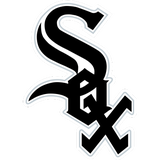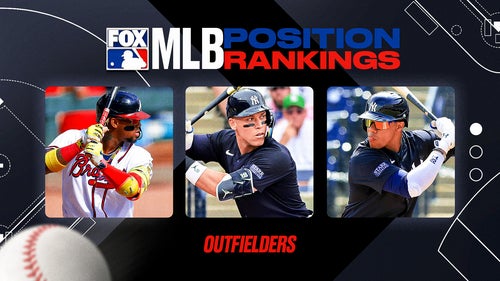
APNewsBreak: MLB international spending soars above $200M
NEW YORK (AP) A record $203 million was spent on international amateur free agents in the just-ended signing period, nearly $50 million more than the previous high and a figure that will plummet when a hard cap on spending starts July 2.
Four Cubans were given contracts that included signing bonuses above $5 million. Chicago White Sox outfielder Luis Robert led the way at $26 million, followed by San Diego pitcher Adrian Morejon at $11 million, and Cincinnati shortstop Alfredo Rodriguez and Padres outfielder Jorge Ona at $7 million each.
Baseball's new labor contract imposes a cap on bonuses for international amateurs, with 16 teams limited in 2017-18 to $4.75 million, six to $5.25 million and eight to $5.75 million - all not counting bonuses of up to $10,000. That limits the 2017-18 bonus pool to $153.5 million.
''The party's over for all big signing bonuses for international amateurs. It's no doubt,'' agent Andy Mota said Monday. ''It's a reality that's setting in, especially with Cuban players.''
And under the new rules, international amateurs were redefined as under 25 years old and with less than six years of professional experience, up from 23 years old and less than five years of experience. That means less money will be chasing more players.
''That's going to really drive a lot of these players to Japanese and Korean baseball,'' agent Scott Boras predicted.
Restraints were introduced in the 2012-16 labor contract on spending on draft picks, players who reside in the U.S., Canada and Puerto Rico. Bonuses for those players totaled $234 million in 2011, dropped to $223 million in the first year of the new rules and didn't reach their prior level until 2015's $249 million, according to Major League Baseball. Draft spending rose to $269 million for 2016 selections.
At the same time, spending on international amateurs increased from $74 million in 2012-13 to $156 million in 2015-16 before the latest hike. And that was despite a tax on teams who exceeded their assigned bonus pools.
San Diego spent $40.8 million on international amateurs in the period that ended June 15, incurring a $37.4 million tax. Other high rollers included the White Sox ($29 million in bonuses, $25.2 million in tax), Cincinnati ($17.7 million/$12.4 million), Atlanta ($17.3 million/$12.8 million), Houston ($10.8 million/$8.6 million), St. Louis ($11 million/$9 million), Oakland ($10 million/$6.2 million), and Washington ($8.3 million/$6 million).
Robert agreed to the second-highest bonus for an international amateur, behind only the $31.5 million deal in 2015 between Cuban infielder Yoan Moncada and Boston, which sent him to the White Sox in December as part of the trade that brought pitcher Chris Sale to the Red Sox.
Some American players were angry that international bonuses soared as their own were limited. Many Venezuelan and Cuban prospects sign around the time they turn 16. Cubans generally sign at an older age.
''I think the goal was to treat international players more comparable to domestic players with respect to the signing bonuses they receive upon signing their first contract,'' said Dan Halem, MLB's chief legal officer.
Each team receives a $4.75 million spending pool in the 2017-18 international signing period that starts July 2, and the 14 teams with competitive-balance round draft picks also get extra international cap room.
For 2017-18, Cincinnati, Miami, Milwaukee, Minnesota, Oakland and Tampa Bay get an additional $500,000 each, and Arizona, Baltimore, Cleveland, Colorado, Houston, Kansas City, Pittsburgh and San Diego $1 million apiece.
Clubs also can trade their cap allocation in increments of $250,000 (and whatever portion of $250,000 is left at the end) starting July 2, with the restriction a team can acquire only 75 percent more than it was originally assigned.
Some teams have incentive to trade their cap space because of penalties lingering from the old rules. Atlanta, Cincinnati, Houston, Oakland, St. Louis, San Diego and Washington are prohibited from signing international amateurs for bonuses of more than $300,000 in the next two signing periods, while the Chicago Cubs, Kansas City, the Los Angeles Dodgers and San Francisco are not allowed to in 2017-18.
Boras maintains young athletes will reject baseball because of a lower economic potential.
''The problem with all of this is other sports are benefiting dramatically,'' he said. ''Soccer in particular is clapping its hands.''
Mota, who consulted on the negotiations that led to Dominican shortstop Luis Almanzar's $4.05 million deal with San Diego last summer, said some teams that had not pursued international players until now may enter the market because the prices will be lower.
Mota said handlers of Latin American players, who often sign them young in exchange for a percentage of the bonuses, are not prepared for the new system. Like Boras, Mota says Japan could become an alternative for Cubans until they turn 25.
''I talk to people who own players, people who manage players, they've been used to asking for whatever they want or playing hardball with teams,'' Mota said, ''and that's no longer going to be the case,'' Mota said.
---
More AP baseball: https://apnews.com/tag/MLBbaseball




